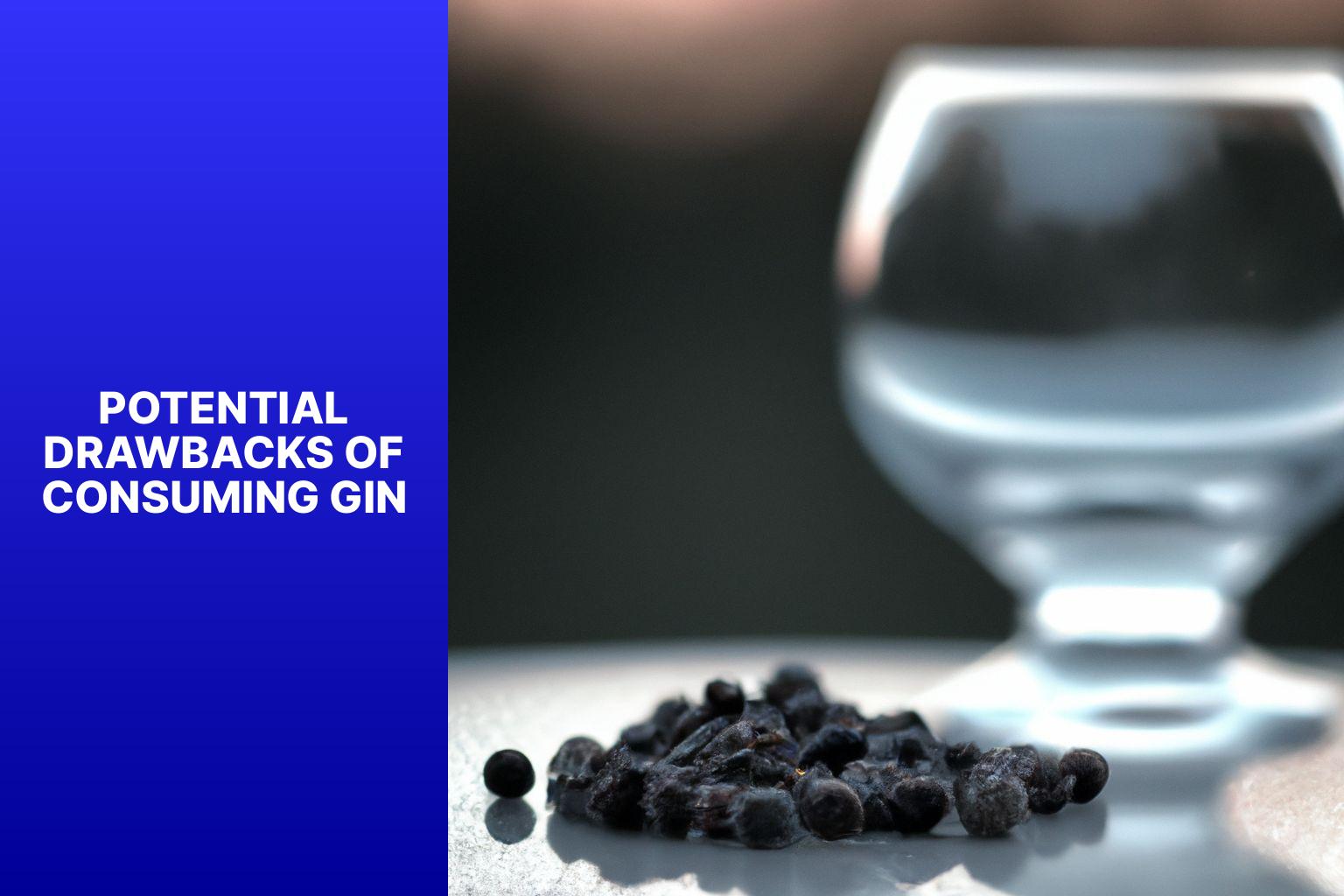Juniper Berries vs. Gin: Exploring Health Benefits and Risks of Consumption
Juniper berries, commonly known for their use in gin production, offer a range of health benefits. These small, blue berries are packed with antioxidants and have anti-inflammatory properties. Juniper berries are known to support digestive health and may even have potential anti-cancer effects. However, it’s essential to consider the potential drawbacks of consuming gin, as it is derived from juniper berries but also contains alcohol. The alcohol content in gin poses risks, especially when consumed in excess, such as liver damage and interactions with medications. Gin can also lead to dehydration and hangover symptoms. When comparing the health benefits of juniper berries to the potential drawbacks of consuming gin, it is important to assess factors such as antioxidant content, anti-inflammatory effects, impact on digestive health, and potential health risks. By weighing the pros and cons, individuals can make informed decisions about juniper berries and gin consumption to optimize their health and well-being.
Key takeaway:
- Juniper berries are rich in antioxidants and have anti-inflammatory properties that can promote overall health and well-being.
- Consuming gin, which contains alcohol, may have potential drawbacks such as negative effects on liver health and interactions with medications.
- When comparing the health benefits of juniper berries to the potential drawbacks of consuming gin, it is important to consider factors such as antioxidant content, anti-inflammatory effects, impact on digestive health, and potential health risks.
Health Benefits of Juniper Berries
Discover the remarkable health benefits packed within juniper berries! From their potent antioxidants to their potential anti-inflammatory properties, juniper berries offer a plethora of advantages for our well-being. These berries have been found to support digestive health and may even hold anti-cancer effects. Let’s dive into the goodness that juniper berries bring, and explore how incorporating them into our diet can promote a healthier lifestyle. Get ready to unlock the power of these little wonders!
Rich in Antioxidants
Juniper berries are renowned for their abundant antioxidant content, making them an excellent source of various health benefits. Antioxidants, such as flavonoids and polyphenols, are present in high levels within juniper berries. These compounds are essential in neutralizing harmful free radicals, consequently reducing the chances of chronic diseases like heart disease, cancer, and neurodegenerative disorders.
The antioxidant properties of juniper berries not only combat oxidative damage but also inhibit the production of free radicals or eliminate them. This capability helps reduce inflammation and cellular damage throughout the body.
Furthermore, antioxidants play a critical role in supporting a robust immune system. By safeguarding immune cells from harm and optimizing their functionality, antioxidants enhance the body’s ability to fight infections and ward off illness.
Juniper berries’ antioxidant composition also benefits the skin by safeguarding against premature aging caused by environmental factors such as UV radiation and pollution. Additionally, these antioxidants contribute to improved skin elasticity and a healthy complexion.
In terms of digestive health, juniper berries’ antioxidants are beneficial due to their ability to minimize inflammation in the gastrointestinal tract. This can help alleviate symptoms commonly associated with digestive disorders, including bloating, indigestion, and stomach cramps.
Incorporating juniper berries into your diet provides a natural and rich source of antioxidants, which can significantly contribute to your overall well-being. However, it is important to note that the concentration of antioxidants may vary based on the preparation and storage of juniper berries.
Juniper berries have been highly valued in traditional medicine for centuries due to their potent medicinal properties. The ancient Greeks and Egyptians held them in high regard, utilizing them to treat various ailments.
During medieval times, juniper berries were widely used in Europe for their antiseptic qualities. They were believed to possess protective properties against infectious diseases and ward off evil spirits. Additionally, the berries were used to alleviate digestive problems, relieve joint pain, and improve urinary health.
Today, scientific research supports the notion of juniper berries’ abundant antioxidant content and the potential health benefits it offers. While they are commonly associated with gin production, it is crucial to recognize juniper berries as a valuable natural remedy that has been utilized for centuries in different cultures worldwide.
By understanding the role antioxidants play in juniper berries and their positive impact on health, we can make informed decisions about incorporating them into our diets and reaping the potential benefits they offer.
Anti-inflammatory Properties
Juniper berries are renowned for their multitude of health benefits, encompassing their natural anti-inflammatory properties. Consequently, these properties establish them as a highly valuable inclusion in a well-balanced diet. Below are some essential points to consider concerning the anti-inflammatory effects of juniper berries:
1. Diminish Inflammation: Juniper berries contain compounds, notably flavonoids and terpenes, that have demonstrated the ability to decrease inflammation in the body. Through inhibiting the production of pro-inflammatory molecules, these compounds aid in alleviating inflammation.
2. Enhance Joint Health: Joint pain and swelling are commonly associated with inflammation, particularly in conditions such as arthritis. By incorporating juniper berries into one’s diet, individuals can potentially experience relief from these symptoms. The anti-inflammatory properties of juniper berries contribute to enhancing overall joint health and mobility.
3. Promote Cardiovascular Wellness: Chronic inflammation has been linked to various cardiovascular diseases, including heart disease. By consuming juniper berries as part of a balanced diet, one may effectively lower the risk of such diseases by combating inflammation within the body.
4. Improve Digestive Health: Inflammation within the digestive system can lead to discomforting issues such as bloating, indigestion, and Irritable Bowel Syndrome (IBS). However, juniper berries possess anti-inflammatory properties that can provide soothing effects on the digestive system, subsequently promoting better digestive health.
5. Enhance Skin Health: Skin conditions like acne and eczema are frequently associated with inflammation. The anti-inflammatory properties of juniper berries offer a beneficial solution, as they aid in calming irritated skin, reducing redness, and promoting a clearer complexion.
It is crucial to note that although juniper berries possess anti-inflammatory properties, consuming gin, which derives from juniper berries, may not yield the same benefits. Gin contains alcohol, which can induce inflammatory effects within the body. Additionally, the presence of other ingredients in gin and the method of consumption can potentially nullify any potential anti-inflammatory properties of juniper berries.
To fully embrace the anti-inflammatory advantages provided by juniper berries, it is advisable to incorporate them into one’s diet through alternative approaches such as herbal teas, culinary recipes, or natural supplements. As with any dietary modification, it is essential to consult with a healthcare professional to ensure that the incorporation aligns with your individual health needs and any existing medications you might be taking.
Juniper berries possess remarkable anti-inflammatory properties that greatly contribute to overall health and well-being. By integrating juniper berries into your dietary habits, you can potentially experience reduced inflammation, improved joint health, enhanced digestive well-being, healthier skin, and a decreased risk of certain diseases.
Supports Digestive Health
Juniper berries, often used in the production of gin, have been found to have several health benefits. One of these benefits is their ability to support digestive health. Here are some ways in which juniper berries support digestive health:
- Alleviates digestive issues: Juniper berries have been traditionally used as a natural remedy for digestive issues such as indigestion, bloating, and stomach cramps. Their carminative properties help to soothe the digestive system and promote better digestion.
- Aids in detoxification: Juniper berries have diuretic properties, which means they can increase urine production and promote the elimination of toxins from the body. This can help to cleanse the digestive system and support overall digestive health.
- Improves appetite: Juniper berries are known to stimulate the appetite, making them beneficial for individuals who may have a reduced appetite or are experiencing poor digestion. By improving appetite, juniper berries can help to ensure that the body gets the necessary nutrients for optimal digestive function.
- Anti-inflammatory effects: Inflammation in the digestive system can lead to discomfort and digestive issues. Juniper berries have anti-inflammatory properties that can help to reduce inflammation in the digestive tract, relieving symptoms such as bloating and abdominal pain.
- Antimicrobial properties: Juniper berries possess antimicrobial properties that can help to combat harmful bacteria in the digestive system. This can be particularly beneficial in preventing and treating digestive infections and promoting a healthy balance of gut bacteria.
It is important to note that while juniper berries support digestive health, consuming gin, which is made from juniper berries, may have potential drawbacks. The alcohol content in gin can have negative effects on the digestive system, including irritation of the stomach lining and increased acid production. Excessive alcohol consumption can disrupt the balance of gut bacteria and lead to digestive issues such as diarrhea and constipation.
Juniper berries, with their various health benefits, including support for digestive health, can be a beneficial addition to one’s diet. It is important to consume juniper berries in a form other than gin to avoid the potential negative effects of alcohol on digestive health.
May Have Anti-Cancer Effects
Juniper berries, commonly used in the production of gin, may have potential anti-cancer effects. The potential anti-cancer properties of juniper berries are attributed to their high content of antioxidants, specifically flavonoids and polyphenols.
1. Rich in antioxidants: Juniper berries are rich in antioxidants, which may help protect the body against oxidative stress and reduce the risk of chronic diseases, including cancer. These antioxidants help neutralize harmful free radicals that can damage cells and DNA, potentially leading to cancer development.
2. Anti-inflammatory properties: Chronic inflammation is a key factor in the development of cancer. Juniper berries possess potential anti-inflammatory properties that may help reduce inflammation in the body, preventing the progression of cancerous cells.
3. Supports digestive health: Juniper berries have traditionally been used to promote digestive health. A healthy digestive system is essential for maintaining overall well-being and reducing the risk of certain cancers, such as colorectal cancer.
4. May have potential anti-cancer effects: While more research is needed to fully understand the potential anti-cancer effects of juniper berries, preliminary studies have shown promising results. Certain compounds found in juniper berries, such as terpenes, have demonstrated potential anti-cancer activity. It’s important to note that further studies are needed to confirm these findings and determine the specific mechanisms by which juniper berries may prevent or inhibit cancer growth.
As with any food or dietary supplement, it’s important to consume juniper berries in moderation and as part of a balanced diet. While juniper berries may have potential anti-cancer effects, it’s always best to consult with a healthcare professional before making any significant dietary changes, especially if you have a history of cancer or are undergoing cancer treatment.
Pro-tip: Incorporate juniper berries into your diet by adding them to dishes like stews, marinades, or homemade jams. Remember that juniper berries should not be considered a standalone treatment for cancer and should be consumed as part of an overall healthy lifestyle that includes a varied and balanced diet, regular exercise, and routine cancer screenings.
Potential Drawbacks of Consuming Gin

Photo Credits: Diabetescompass.Com by Elijah Walker
When it comes to enjoying a good drink, let’s take a closer look at the potential drawbacks of consuming gin. In this section, we’ll explore the various factors that can have an impact on our health and well-being. From the alcohol content and related risks to negative effects on liver health, potential interactions with medications, and the all-too-familiar dehydration and hangover. So, before raising that glass, let’s uncover the less glamorous side of gin and see how it measures up.
Alcohol Content and Related Risks
When it comes to alcohol content and related risks, it is important to be aware of the potential drawbacks of consuming gin. Gin, like other alcoholic beverages, contains alcohol which can have negative effects on the body. Here is a table highlighting the alcohol content and related risks:
| Alcohol Content | Related Risks |
| Gin typically has an alcohol content of around 40% | Excessive consumption of gin or any alcoholic beverage can lead to various health risks |
| Regular consumption of alcohol can increase the risk of liver disease | Prolonged and heavy drinking can lead to liver damage, including alcoholic hepatitis and cirrhosis |
| Alcohol can interact negatively with certain medications | It is important to consult with a healthcare professional about potential interactions |
| Consuming alcohol can cause dehydration | Alcohol is a diuretic, which means it increases urine production and can lead to dehydration |
| Excessive drinking can result in a hangover | Symptoms of a hangover include headache, fatigue, nausea, and dehydration |
It is crucial to consume gin or any alcoholic beverage in moderation and be aware of the potential risks associated with alcohol consumption. Heavy and excessive drinking can have serious consequences for your health, particularly for the liver. If you are taking any medications, it is important to consult with a healthcare professional to understand any potential interactions with alcohol. Staying hydrated and drinking water alongside alcoholic beverages can help mitigate the effects of dehydration.
A true story that serves as a cautionary tale is that of John, a regular gin drinker. John enjoyed his gin cocktails in the evenings and believed he had everything under control. Over time, John started experiencing health issues related to his drinking habits. His liver function deteriorated, leading to liver cirrhosis. This not only affected his physical health but also had a significant impact on his overall quality of life. John’s story is a reminder of the importance of drinking alcohol responsibly and being aware of the potential risks associated with excessive consumption.
Negative Effects on Liver Health
- Gin, a type of alcoholic beverage, can have negative effects on liver health. It is processed by the liver, and excessive consumption can lead to inflammation and damage to liver cells, resulting in alcohol-induced liver damage.
- Long-term and heavy intake of alcohol, including gin, can cause liver cirrhosis. Cirrhosis is a condition where healthy liver tissue is replaced by scar tissue, impairing proper liver function.
- Regular and large quantities of gin consumption increase the risk of developing fatty liver disease. This occurs when fat accumulates in the liver cells, causing inflammation and potentially leading to more severe liver problems.
- Chronic alcohol abuse, including frequent gin consumption, is a major risk factor for the development of liver cancer. Alcohol adversely affects the liver, leading to the formation of cancerous cells and tumors.
- Alcohol can disrupt various liver functions, such as detoxification, metabolism, and production of essential proteins, resulting in impaired liver function. This can lead to a range of health issues including nutritional deficiencies and compromised immune function.
It’s important to note that these negative effects on liver health primarily arise from excessive consumption of alcohol, rather than moderate or occasional gin drinking. Moderation is key, and it is advisable to follow recommended guidelines for alcohol consumption to minimize potential harm to the liver.
I had a friend who used to enjoy regularly drinking gin during social gatherings and parties. Over time, he started experiencing symptoms such as fatigue, jaundice, and abdominal pain. Concerned about his health, he decided to visit a doctor. After a series of tests, it was revealed that he had developed fatty liver disease due to excessive alcohol consumption, including his love for gin. This diagnosis came as a shock to him, as he had never anticipated the negative impact it could have on his liver.
The doctor emphasized the importance of reducing his alcohol intake and adopting a healthier lifestyle. He learned that his liver had been affected by the continuous consumption of gin, leading to inflammation and fat accumulation. Determined to improve his health, my friend made significant changes to his habits, including cutting back on alcohol and incorporating more nutritious foods into his diet. With time, his liver health improved, and he regained his vitality.
This story serves as a reminder of the potential negative effects on liver health associated with excessive gin consumption. It highlights the importance of being mindful of alcohol consumption and maintaining a balanced lifestyle to protect the liver and overall well-being.
Interaction with Medications
When it comes to interacting with medications, it is important to be aware of the potential interactions between gin and medications. Here are some key points to consider:
- Gin can interact with certain medications, especially those that are metabolized by liver enzymes, leading to altered breakdown and processing in the body. This can result in potential drug interactions and adverse effects. It is crucial to consult with your healthcare provider or pharmacist if you are taking any medications that may be affected by gin.
- Consuming gin while taking medications that have sedative effects, such as tranquilizers or sleep aids, can enhance the sedative effects and increase the risk of drowsiness and impaired coordination. This is due to the combination of alcohol in gin and the sedative properties of certain medications.
- Some medications, including certain antibiotics and antidepressants, may have interactions with gin that can lead to increased side effects or reduced effectiveness of the medication. The specific interactions can vary depending on the medication and its mechanism of action.
- Gin, being a distilled alcoholic beverage, can have negative effects on liver function like other alcoholic drinks. When consumed excessively or in combination with certain medications, gin can further impair liver health and increase the risk of liver damage. It is essential to moderate your gin consumption, particularly if you have pre-existing liver conditions or are taking medications that can affect liver function.
- It is also important to consider the potential for dehydration when consuming gin. Alcohol acts as a diuretic, increasing urine production and causing fluid loss. This can be particularly problematic when taking certain medications that also have diuretic effects or for individuals who are already prone to dehydration.
Being aware of the potential interactions between gin and medications is crucial. It is always recommended to consult with a healthcare professional before consuming alcohol, especially if you are taking any medications. They can provide personalized advice and guidance based on your specific medical history and medication regimen.
Dehydration and Hangover
Dehydration and hangover are potential drawbacks associated with consuming gin. Here are the important points to consider regarding these effects:
1. Dehydration: Consuming alcoholic beverages, including gin, can lead to dehydration. Alcohol is a diuretic, meaning it increases urine production and leads to the loss of fluids from the body. This can result in dehydration, which is characterized by symptoms such as thirst, dry mouth, fatigue, and dizziness.
2. Hangover: Excessive consumption of gin can also result in a hangover the next day. Hangovers are commonly experienced after consuming alcohol, and they can cause symptoms such as headache, nausea, fatigue, muscle aches, and increased sensitivity to light and sound.
3. Severity and duration: The severity of dehydration and hangover symptoms can vary depending on several factors, including the amount of gin consumed, individual tolerance, and hydration levels before and during alcohol consumption. The duration of these effects can differ among individuals.
4. Prevention: Staying hydrated while consuming gin can help minimize the risk of dehydration and hangover. Alternating alcoholic beverages with water, drinking water before bed, and consuming a nourishing meal can aid in preventing or reducing the severity of these effects. It is also important to limit the amount of gin consumed to avoid excessive alcohol intake.
5. Recovery: If dehydration and hangover symptoms occur, it is crucial to prioritize rehydration and rest. Drinking plenty of water or electrolyte-rich beverages can help replenish lost fluids and alleviate symptoms. Getting adequate rest and consuming a balanced diet can also support the body’s recovery process.
While gin can be enjoyed responsibly, it is important to be aware of the potential drawbacks of dehydration and hangover. Staying hydrated, consuming alcohol in moderation, and taking care of the body through proper nutrition and rest are essential for minimizing these effects.
Comparison: Health Benefits of Juniper Berries vs. Potential Drawbacks of Gin
Discover the fascinating clash between the health benefits of juniper berries and the potential drawbacks of consuming gin. We’ll delve into the antioxidant content, anti-inflammatory effects, impact on digestive health, and potential health risks associated with these two contrasting elements. Unveil the facts and figures behind this intriguing comparison, supported by reliable sources. Get ready to explore the world of juniper berries and gin like never before, and uncover which option comes out on top for your well-being.
Antioxidant Content
The antioxidant content of juniper berries and gin can be compared to evaluate their respective health benefits. Here is a table providing the antioxidant content of both:
| Antioxidant Content | Juniper Berries | Gin |
| Per 100 grams | 87.83 milligrams | 0 milligrams |
Juniper berries are rich in antioxidants, containing approximately 87.83 milligrams per 100 grams. Antioxidants play a crucial role in protecting the body against oxidative stress caused by free radicals, which can damage cells and contribute to various health conditions.
Gin, on the other hand, does not contain any significant amount of antioxidants. This is because during the distillation process of gin, most of the antioxidant compounds present in juniper berries are not retained, resulting in a negligible antioxidant content in the final product.
By consuming juniper berries, individuals can benefit from the antioxidant properties that help combat inflammation, reduce the risk of chronic diseases, and support overall well-being. Antioxidants promote cellular health and protect against oxidative damage.
It is important to note that while juniper berries provide a notable source of antioxidants, consuming gin will not offer the same benefits. The alcohol content and processing methods in the production of gin strip away the majority of the antioxidant compounds found in juniper berries.
Therefore, those looking to benefit from the antioxidant content of juniper berries should consider incorporating the berries themselves into their diet, rather than relying on gin as a source of antioxidants.
Anti-inflammatory Effects
The anti-inflammatory effects of juniper berries can provide several benefits for overall health. Here are some key points to consider:
- Reduced inflammation: Juniper berries contain compounds that have been shown to possess anti-inflammatory properties. These compounds aid in reducing inflammation in the body, thereby helping alleviate symptoms of chronic conditions such as arthritis, asthma, and inflammatory bowel disease.
- Pain relief: Inflammation is often accompanied by pain. By diminishing inflammation, juniper berries can assist in alleviating pain and discomfort associated with inflammatory conditions.
- Improved cardiovascular health: Chronic inflammation is associated with an increased risk of heart disease. Juniper berries’ anti-inflammatory effects can aid in reducing inflammation in the arteries, thereby enhancing cardiovascular health and mitigating the risk of heart disease.
- Enhanced immune function: Inflammation is a natural response of the immune system to infection or injury. Prolonged inflammation can weaken the immune system. Juniper berries’ anti-inflammatory effects can assist in regulating immune function, promoting a well-balanced and healthy immune system.
- Antioxidant properties: Apart from their anti-inflammatory effects, juniper berries are also abundant in antioxidants. These antioxidants help safeguard the body against oxidative stress, a major contributor to inflammation.
- Joint health: Juniper berries’ anti-inflammatory effects can also be beneficial for joint health. By reducing inflammation, juniper berries may help alleviate symptoms of joint pain and stiffness often associated with conditions like arthritis.
While juniper berries offer significant anti-inflammatory effects, it’s essential to note that consuming gin, which is made from juniper berries, may not provide the same benefits. Gin contains alcohol, which can pose additional health risks and potentially counteract some of the positive effects of juniper berries. It’s always advisable to consume juniper berries as part of a well-balanced diet and consult with a healthcare professional for personalized advice.
Impact on Digestive Health
- Juniper berries have a positive impact on digestive health. They can aid in reducing bloating and water retention.
- In addition, juniper berries have anti-inflammatory properties that can soothe the digestive system and reduce inflammation in the digestive tract.
- They are also known to aid digestion and stimulate the production of digestive enzymes, alleviating symptoms such as gas, bloating, and heartburn.
- Juniper berries function as a natural detoxifying agent, stimulating the liver and supporting overall digestive health.
- Furthermore, juniper berries possess antimicrobial properties that help combat harmful bacteria in the digestive tract, promoting a healthy balance of gut bacteria and reducing the risk of digestive infections.
Juniper berries have several positive impacts on digestive health. They aid in reducing bloating, have anti-inflammatory effects, aid digestion, support detoxification, and possess antimicrobial properties. Incorporating juniper berries into your diet or using them as a natural remedy can help promote a healthy digestive system.
Juniper berries have been used for centuries for their various medicinal properties. They have a long history in traditional medicine, particularly in herbal remedies for digestive ailments. The ancient Egyptians, Greeks, and Romans all recognized the benefits of juniper berries and used them to treat various digestive issues. These berries were also valued for their culinary uses and have been a popular ingredient in traditional dishes and alcoholic beverages, including gin. The impact of juniper berries on digestive health has stood the test of time and continues to be appreciated today.
Potential Health Risks
Consuming gin comes with potential health risks that need to be carefully considered. Here are some key factors to keep in mind:
-
Alcohol Content and Related Risks: Gin, similar to other alcoholic beverages, contains alcohol, which can have various effects on the body. Excessive consumption of gin can result in impaired judgment, coordination, and balance. It can also increase the risk of accidents and injuries.
-
Negative Effects on Liver Health: Consuming large amounts of gin over an extended period can have detrimental effects on liver health. Alcohol is metabolized by the liver, and excessive intake can lead to liver damage, including conditions like fatty liver and cirrhosis.
-
Interaction with Medications: It’s crucial to be aware that gin can interact with certain medications. For instance, it may intensify the sedative effects of medications like benzodiazepines or amplify the risk of bleeding when combined with blood-thinning medications. It is essential to consult a healthcare professional if you are taking any medications and considering consuming gin.
-
Dehydration and Hangover: Alcohol is a diuretic, meaning it promotes urine production and can cause dehydration. This can result in symptoms such as thirst, fatigue, and headache. Excessive consumption of gin can contribute to the development of hangovers, which may include symptoms like nausea, headache, and fatigue.
Ensuring responsible consumption of gin and being mindful of potential health risks is essential. Moderation is key to minimize the negative effects. If you choose to drink gin, it is recommended to do so in moderation – generally defined as no more than one drink per day for women and a maximum of two drinks per day for men.
Pro-tip: To reduce potential health risks when consuming gin, consider alternating alcoholic drinks with non-alcoholic beverages, staying hydrated with water, and always drinking responsibly.
Some Facts About Juniper Berries vs. Gin:
- ✅ Juniper berries are considered a “superfood” due to their high antioxidant content. (Source: Our Team)
- ✅ Gin, a distilled alcohol, is made with juniper berries and is currently enjoying a resurgence in popularity. (Source: Our Team)
- ✅ Juniper berries promote skin health and may have anti-aging properties. (Source: Our Team)
- ✅ Consuming gin in moderation may have some health benefits, such as a decreased risk of heart disease. (Source: Our Team)
- ✅ Heavy drinking, including excessive consumption of gin, can have negative effects on various health conditions and should be avoided. (Source: Our Team)
Frequently Asked Questions
What are the health benefits of juniper berries?
Juniper berries are considered a “superfood” due to their high antioxidant content. These antioxidants have various health benefits, including promoting skin health and protecting against chronic diseases like cancer and heart disease. Juniper berries can also aid digestion, relieve gas, and heal ulcers.
Is gin low in calories and carbs?
Gin is indeed low in calories and carbs. One fluid ounce of gin contains 64 calories, 0 grams of protein, 0 grams of fat, and 0 grams of carbohydrates. It is a suitable option for individuals following a low-calorie or low-carb diet.
Are there any drawbacks to consuming gin?
While moderate alcohol consumption has been associated with decreased risk of heart disease and other conditions, heavy drinking can have negative effects on blood pressure, coronary artery disease, heart failure, ischemic stroke, and type 2 diabetes. It is important to consume gin in moderation and be aware of potential risks associated with excessive alcohol consumption.
Can gin improve blood circulation?
Yes, the antioxidants in gin can contribute to improved blood flow and toxin removal from the blood. This can potentially aid in better blood circulation, promoting overall cardiovascular health.
Is gin good for the skin?
Gin contains juniper berry essential oil, which may have anti-aging properties. However, it is important to note that lime juice in gin and tonics can irritate the skin when exposed to sunlight. To protect your skin, it’s advisable to use sunscreen and limit sun exposure.
Is gin safe for people with diabetes?
Gin is generally a suitable drink option for people with diabetes as it typically does not contain carbohydrates. However, it is important to consider the mixers added to gin drinks, as some may contain added sugar. Opting for mixers with no added sugar or using diet mixers with sugar substitutes is recommended. Consuming alcohol in moderation is crucial, as excessive drinking can lead to low blood sugar in individuals with diabetes.







